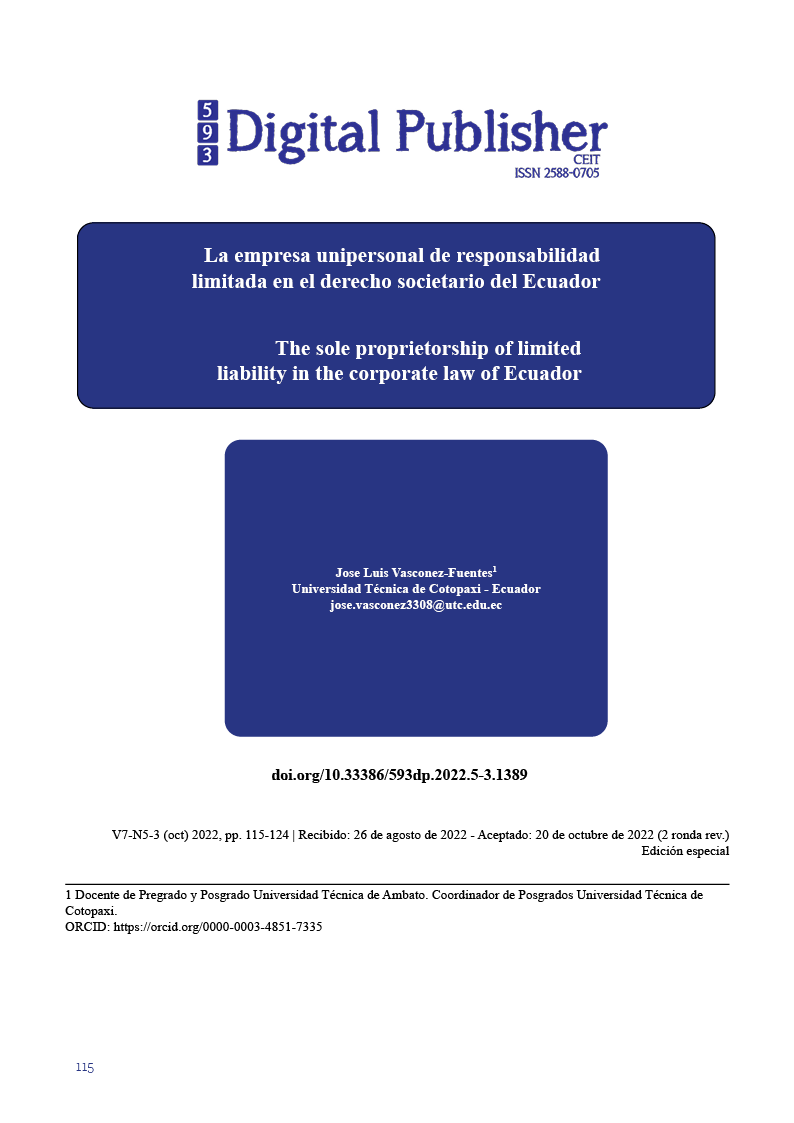The sole proprietorship of limited liability in the corporate law of Ecuador
Main Article Content
Abstract
Corporate law focuses fundamentally on the need to reconsider the extension of the privilege of limited liability in the context of the modernization of this branch of law. For this reason, the objective focused on establishing key points such as the reform of the Companies Law so that sole proprietorships are included in it and therefore the Superintendence of Companies. The applied method had a proactive critical approach, of a qualitative nature, information contained in norms and legal bodies was reviewed, according to the design of grounded theory, which allows comparing and supporting the regulations on the sole proprietorship of limited liability in the corporate law of Ecuador. It was concluded that there are several weaknesses regarding the business model, since the perspective of the experts agrees that the benefits that the constitution of a sole proprietorship limited liability company brings should be disseminated since, due to the ignorance of the people who work in Informal sectors of production are not interested in establishing this type of business model that provides legal protection to workers.
Downloads
Article Details

This work is licensed under a Creative Commons Attribution-NonCommercial-ShareAlike 4.0 International License.
1. Derechos de autor
Las obras que se publican en 593 Digital Publisher CEIT están sujetas a los siguientes términos:
1.1. 593 Digital Publisher CEIT, conserva los derechos patrimoniales (copyright) de las obras publicadas, favorece y permite la reutilización de las mismas bajo la licencia Licencia Creative Commons 4.0 de Reconocimiento-NoComercial-CompartirIgual 4.0, por lo cual se pueden copiar, usar, difundir, transmitir y exponer públicamente, siempre que:
1.1.a. Se cite la autoría y fuente original de su publicación (revista, editorial, URL).
1.1.b. No se usen para fines comerciales u onerosos.
1.1.c. Se mencione la existencia y especificaciones de esta licencia de uso.
References
ASÍS, R. (2020). Crónica de las XXVII Jornadas de la Sociedad Española de Filosofía Jurídica y Política. In Anuario de Filosofía del Derecho (Vol. 2020, Issue Xxxvi).
Andrade, M. (2020). La desconfiguración de la responsabilidad limitada en el Ecuador con mención a las compañías de responsabilidad limitada y sociedades anónimas (Doctoral dissertation, Quito: Universidad de Los Hemisferios 2020).
Bermejo, M. (2019). Temporalidades inter/disciplinarias.
Bustamante, L., Porto, I., & Hernández, F. (2016). Gestión estratégica de las áreas funcionales de la empresa: una perspectiva competitiva internacional. Revista De Investigación, Desarrollo E Innovación, 4(1), 56. https://doi.org/10.19053/20278306.2607
Capriotti, P. (2010). Branding corporativo. Gestión estratégica de la identidad corporativa. Comunicación, 0(27), 15–22.
Esplugues, C. (2013). El régimen jurídico de la mediación civil y mercantil en conflictos traNsfronterizos en España tras la Ley 5 / 2012 , de 6 de julio. Boletín Mexicano de Derecho Comparado, 46(136), 165–199.
Fernández, S. (2009). La Mediación Social: Itinerario Resolución De Conflictos Sociales. La Razón Histórica, 9, 77–97.
Jara, C., & Umpierrez, S. (2014). Evolución del sector público ecuatoriano desde 1998 a 2013. Revista Enfoques, 12(21), 131–148.
Jequier, E. (2016a). La mediación como alternativa de solución de los conflictos empresariales en Chile: Razones y mecanismos para su regulación. Revista de Derecho (Valdivia), 29(1), 91–118. https://doi.org/10.4067/s0718-09502016000100005
Jequier (2011b). Unipersonalidad y sociedad con un solo socio; alcances de su reconocimiento en la estructura dogmática del derecho. Scielo, 189-230.
Lastra, A. (2020). Existencia de las sociedades unipersonales en Colombia: Una mirada a su vida jurídica y legalidad. Vis Iuris. Revista de derecho y ciencias sociales.
Nina, G., & Gamarra, R. (2020). Fundamentos para la inclusión de la Empresa Unipersonal de Responsabilidad Limitada en la legislación Boliviana. Revista de Difusión cultural y científica de la Universidad La Salle en Bolivia, 20(20), 75-106.
Osorio, X., & Campos, H. (2018). Justicia restaurativa y mediación penal en Chile. Revista de Derecho (Coquimbo), 10(98), 141–160. https://doi.org/10.22199/s07189753.2003.0001.00007
Reinoso, J. E. F. (2020). Aspectos conceptuales, doctrinales y legales sobre la ley de la empresa individual de responsabilidad limitada. Sapientia & iustitia, (1), 61-75.
Reyes, F. (2019). Modelo de gestión basado en responsabilidad social empresarial para la cooperativa de ahorro y crédito Kullki. ISSN 2502-3632 (Online) ISSN 2356-0304 (Paper) Jurnal Online Internasional & Nasional Vol. 7 No.1, Januari – Juni 2019 Universitas 17 Agustus 1945 Jakarta, 53(9), 1689–1699.
Rivas-Cedeño, L. L., & De Valgas-Cedeño, S. B. F. (2018). Derecho societario: las compañías en el Ecuador. Polo del conocimiento, 3(1), 197-213.
Salgado, R. (2015). Tratado de Derecho Empresarial y Societario. Tomo IV.
Schwalb, M. (2011). RSE en America Latina. In La Responsabilidad social de la empresa en America latina (pp. 87–110).
Tejeda, N., & Romero, L. (2021). Las micro, pequeñas y medianas empresas. Alternativas para su organización jurídica en Cuba. Estudios del Desarrollo Social: Cuba y América Latina, 9(2), 292-303.
Vaccaro, C. S. (2012). Distintividad Y Uso De Las Marcas Comerciales. Revista Chilena de Derecho.


